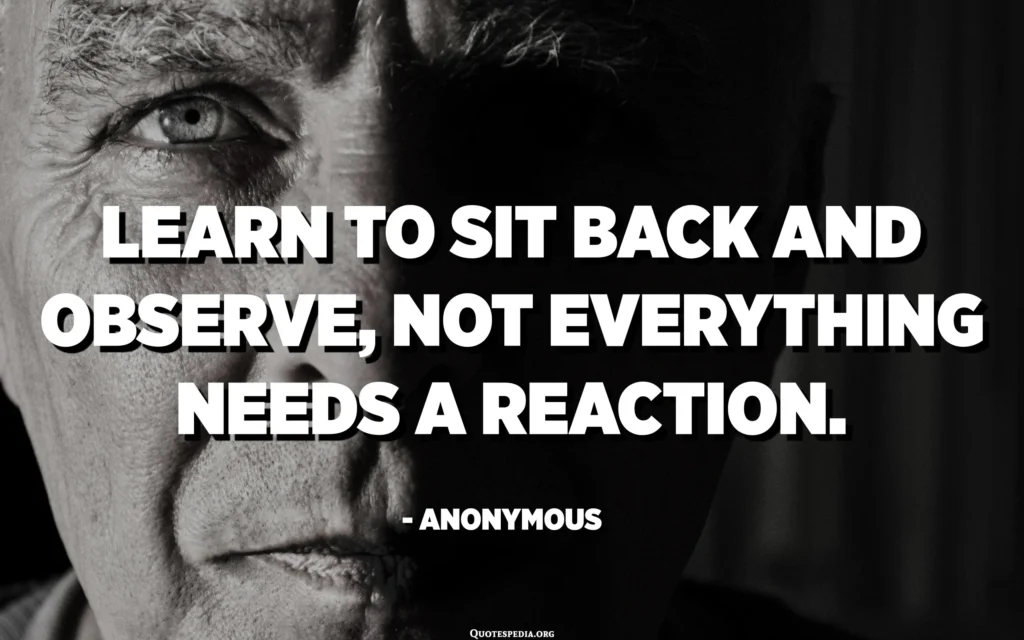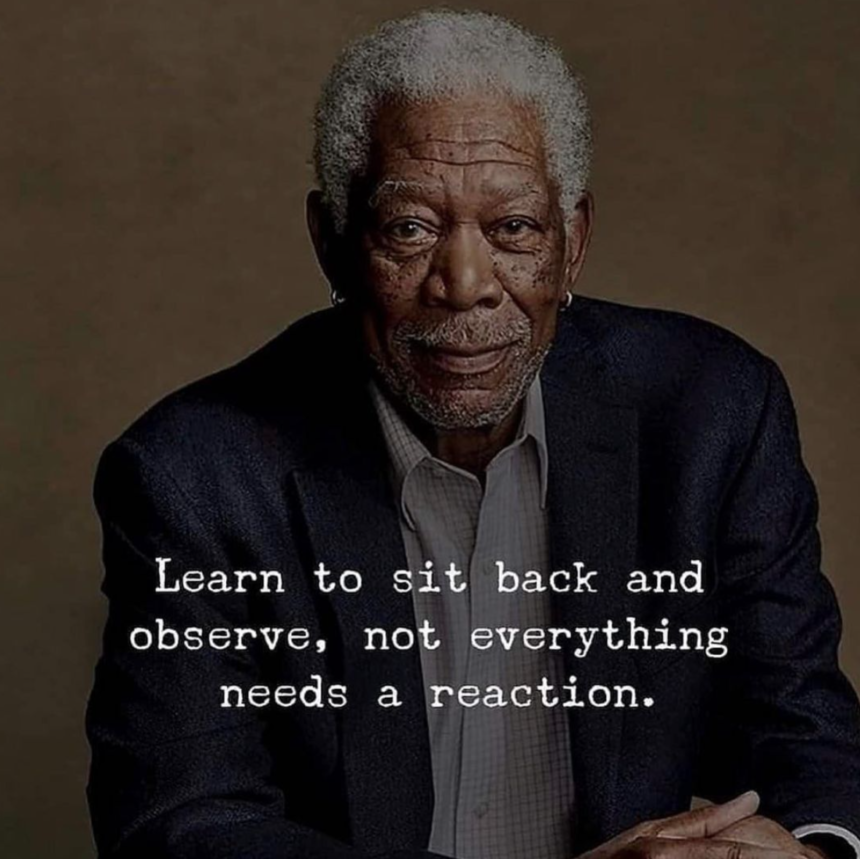Introduction: Learn to Sit Back and Observe. Not Everything Needs Your Immediate Reaction
In today’s fast-paced world, where everything seems to demand our immediate attention, it’s essential to learn to sit back and observe. Not everything needs an instant reaction. This approach can save you from unnecessary stress and help you make better decisions. By taking a moment to step back and reflect, you give yourself the gift of clarity, which is crucial in navigating life’s challenges.
The ability to observe without immediately reacting is a skill that can be cultivated. It requires mindfulness, patience, and a willingness to embrace a slower, more thoughtful pace. This blog post will explore why it’s important to learn this skill and how you can integrate it into your daily life.
Why It’s Important to Learn to Sit Back and Observe
The Power of Patience Learning to sit back and observe teaches you the power of patience. Patience is not just about waiting; it’s about how you behave while waiting. When you react instantly to situations, you may act out of impulse rather than reason. By observing, you allow your emotions to settle, giving you the opportunity to respond more thoughtfully.
Improved Decision-Making When you take the time to observe, you gather more information, which leads to better decision-making. Rash decisions often result from incomplete understanding. By sitting back and observing, you ensure that you consider all aspects of a situation before deciding on a course of action.
How to Cultivate the Habit of Observing Before Reacting

Practice Mindfulness Mindfulness is the practice of being present in the moment. When you are mindful, you are more aware of your thoughts, feelings, and surroundings. This awareness allows you to pause and observe rather than react impulsively. Mindfulness can be developed through meditation, breathing exercises, or simply taking a moment to notice your environment.
Ask Yourself Questions Before reacting to a situation, ask yourself a few simple questions: Is this worth my energy? What are the possible outcomes? How will my reaction impact the situation? These questions can help you determine whether a response is necessary or if it’s better to remain silent and observe.
The Benefits of Observing Over Reacting
Emotional Control Learning to sit back and observe gives you greater control over your emotions. When you react without thinking, you may say or do things you later regret. By observing first, you can choose your response more wisely, leading to better emotional outcomes.
Better Relationships In relationships, whether personal or professional, taking the time to observe can lead to better communication and understanding. Instead of reacting defensively, you can listen more carefully to what the other person is saying, which fosters empathy and mutual respect.
Common Challenges in Learning to Sit Back and Observe
Overcoming Impulsiveness For many people, the hardest part of learning to sit back and observe is overcoming the urge to react immediately. Impulsiveness is a natural response, especially in stressful situations. However, with practice, you can train yourself to pause and consider your options before responding.
Dealing with External Pressure Sometimes, the pressure to react comes from external sources, such as peers, social media, or workplace expectations. It’s essential to recognize that you have the power to control your responses. Learning to sit back and observe can help you resist the pressure to conform to others’ expectations.
Tips for Practicing Observation in Everyday Life
Start with Small Situations You don’t have to wait for a significant event to practice sitting back and observing. Start with small, everyday situations. For example, the next time someone cuts you off in traffic, instead of reacting with anger, take a deep breath and observe how you feel. This small practice can make a big difference over time.
Create a Reflection Routine At the end of each day, take a few minutes to reflect on situations where you could have observed more and reacted less. What could you have done differently? This reflection will help you recognize patterns in your behavior and areas where you can improve.
The Impact of Observing on Mental Health
Reduced Stress When you learn to sit back and observe, you reduce the stress associated with constant reacting. Every reaction requires mental energy, and by conserving this energy, you can maintain a calmer, more peaceful state of mind.
Increased Self-Awareness Observation leads to greater self-awareness. When you take the time to observe your reactions, you learn more about your triggers and emotional responses. This self-awareness is the first step toward personal growth and emotional intelligence.
Read more: Build Insane Triceps by Doing Skull Crushers: Ultimate Guide for Massive Arms
FAQ: Learn to Sit Back and Observe. Not Everything Needs Immediate Action
Learning to sit back and observe is crucial because it allows you to make more informed decisions, manage your emotions better, and improve your relationships. By not reacting impulsively, you can approach situations with a clearer mind.
You can practice this by being mindful, asking yourself reflective questions before responding, and starting with small situations where you would normally react impulsively. Over time, this habit will become second nature.
The benefits include better decision-making, emotional control, improved relationships, reduced stress, and increased self-awareness. These benefits contribute to a more balanced and fulfilling life.
Some common challenges include overcoming impulsiveness and dealing with external pressure to react. It requires practice and patience to build this habit, but the long-term benefits are worth the effort.
Observing rather than reacting reduces stress, conserves mental energy, and enhances self-awareness. These factors positively impact mental health, leading to a calmer and more resilient mindset.
Conclusion: Embrace the Art of Observation
Learning to sit back and observe is a powerful skill that can transform your life. Not everything needs your immediate reaction, and by taking the time to observe, you can approach challenges with a clearer mind and a more balanced perspective. Start small, practice regularly, and soon you will notice the positive impact this habit has on your decision-making, relationships, and overall well-being.





